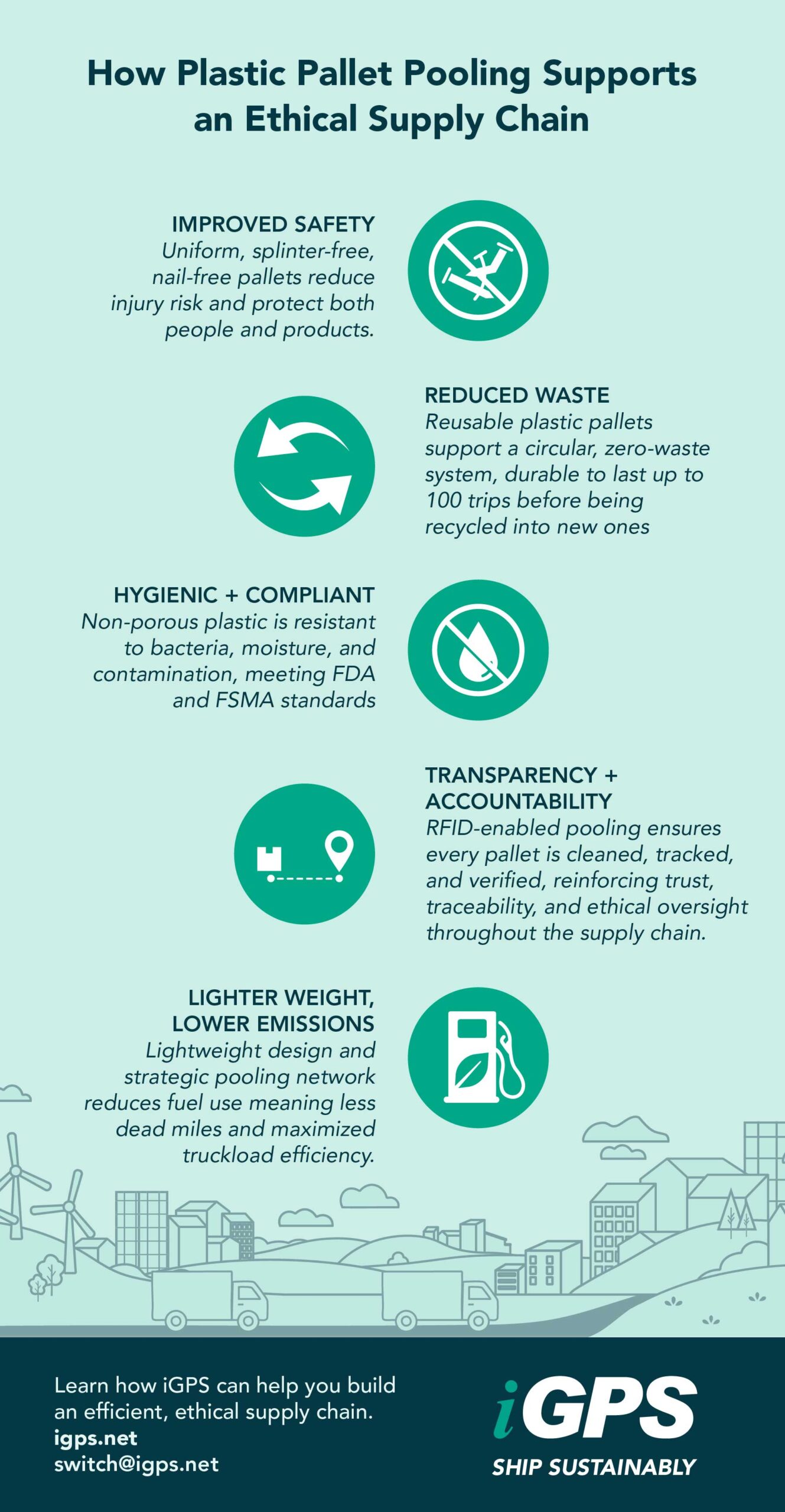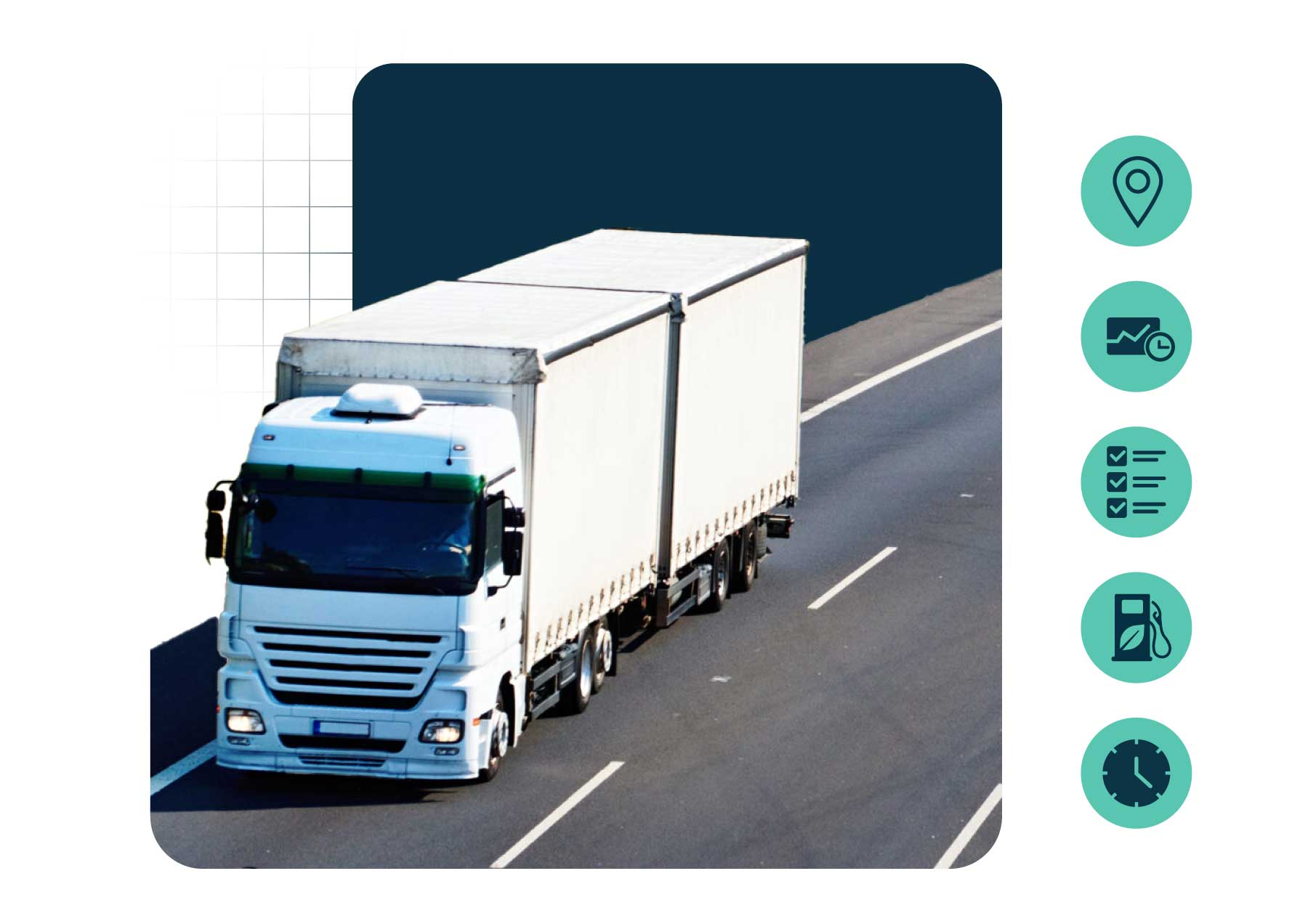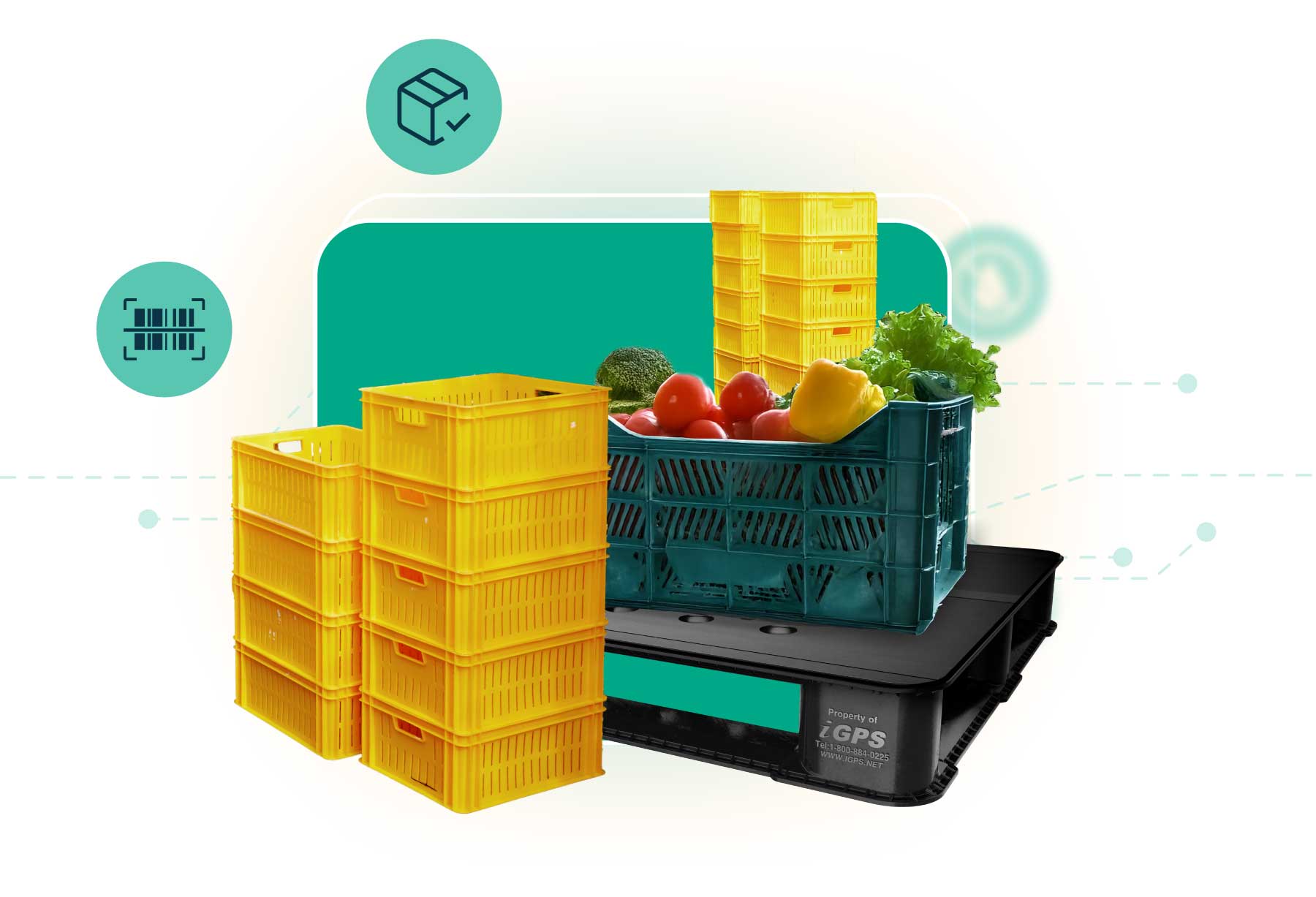Key Takeaways
- Ethical supply chains have become a business standard, driven by growing consumer demand for transparency, sustainability, and accountability.
- Regulations like the UN Global Compact and FSMA demand responsible sourcing and traceability.
- RFID-enabled plastic pallets cut waste, improve hygiene, and increase visibility across operations.
- Pallet pooling reduces emissions and landfill waste through shared, reusable systems.
- Ethical, traceable logistics strengthen trust, reduce risk, and support sustainable growth.
Ethical supply chains are no longer a brand differentiator—they’re the new business standard. As global logistics grow more complex, companies face rising expectations to operate transparently, reduce environmental impact, and uphold fair labor practices.
The Edelman Trust Barometer 2024 reports that 63% of consumers say their brand choices reflect their social values. This shows that transparency, accountability, and ethical action now strongly influence how people decide what to buy and which companies to support. Similarly, McKinsey & Company found that organizations embedding sustainability into their supply-chain strategies outperform peers in resilience, cost savings, and long-term growth.
Regulators and industry groups are reinforcing these expectations. The United Nations Global Compact calls sustainable supply chains essential for advancing global labor and environmental goals, while the FDA’s Food Safety Modernization Act (FSMA) emphasizes stronger oversight and traceability throughout production and distribution.
Building an ethical supply chain requires systems that prioritize transparency, safety, and sustainability—from sourcing and labor practices to logistics and data tracking.
What Is an Ethical Supply Chain
An ethical supply chain runs on fairness, transparency, and accountability. It ensures materials come from responsible sources, workers are treated with respect, and waste stays low.
Ethics in logistics extend beyond fair labor. They include safety, traceability, and sustainable equipment choices. A practical example is the shift from wood to reusable, RFID-tracked plastic pallets. These circulate through a closed-loop network, cutting landfill waste, lowering emissions, and improving operational visibility.
Key Elements of an Ethical Supply Chain
Ethical supply chains require clear oversight and shared responsibility. Every stage—from sourcing to delivery—needs monitoring and measurable standards.
Core elements include:
- Responsible sourcing: Work with suppliers who meet safety, quality, and social benchmarks.
- Fair labor: Maintain safe conditions, fair pay, and zero tolerance for exploitation.
- Environmental care: Reduce emissions, conserve energy, and manage materials responsibly.
- Data transparency: Track, verify, and share performance to build trust.
Reusable, RFID-tracked plastic pallets support these efforts by reducing raw material use, improving cleanliness between shipments, and shrinking a company’s carbon footprint. Together, these actions create a system that is efficient, accountable, and sustainable.
Best Practices for Building an Ethical Supply Chain
Building an ethical supply chain starts with clear standards, consistent enforcement, and transparent communication across every link in the network.
1. Set and Enforce Standards
- Establish written policies on labor, safety, and environmental practices.
- Conduct regular supplier audits to ensure compliance with local and international laws.
- Verify sourcing to confirm materials are obtained responsibly and ethically.
2. Prioritize Transparency
- Share data on sourcing, transportation, and production with stakeholders.
- Use visibility tools to identify risks early and prevent compliance gaps.
- Report performance openly to strengthen trust and accountability.
3. Design for Sustainability
- Choose reusable, RFID-tracked plastic pallets within pooling systems to reduce waste, energy use, and carbon emissions.
- Standardize equipment and logistics processes to promote efficiency and safety.
- Integrate sustainability metrics into purchasing and operations decisions.
By combining ethical oversight with sustainable logistics, companies can create supply chains that:
- Protect workers and communities
- Support long-term compliance
- Minimize environmental impact
Challenges for Ethical Supply Chain Success
Creating an ethical supply chain comes with practical challenges. Global sourcing makes it difficult to monitor every supplier, especially when oversight varies across regions. Labor violations, unsafe conditions, or environmental harm can go unnoticed without strong visibility systems.
Cost pressures also play a role. Ethical practices—such as audits, certifications, and sustainable materials—can raise short-term expenses, leading some companies to cut corners.
Data fragmentation adds complexity. When supply chain data is scattered, tracking compliance and verifying claims become harder. Using standardized, RFID-enabled tools like pooled plastic pallets helps close visibility gaps and support accountability across every stage.

The Role of Plastic Pallets in an Ethical Supply Chain
Plastic pallets support ethical and sustainable supply chains by improving safety, reducing waste, and strengthening transparency. They also generate the data needed to hold vendors accountable and maintain responsible sourcing.
- Improve Safety and Hygiene
Smooth, non-porous surfaces prevent splinters and contamination. Their consistent size makes handling safer and easier for workers, while clean, standardized equipment supports compliance with hygiene and safety rules. - Reduce Waste and Environmental Impact
Unlike wood pallets, plastic pallets don’t absorb moisture or end up in landfills. Each unit can be used 100+ times then fully recycled at the end of its life, reducing raw material use and carbon emissions. - Increase Transparency and Accountability
RFID-enabled pallets in pooling networks are cleaned, inspected, and tracked to verify quality and usage. This traceability gives companies greater control of their supply chain, helps identify non-compliance, and supports data-driven decisions that build ethical, responsible operations.
How does Pallet Pooling Support an Ethical Supply Chain?
Pallet pooling reduces waste and increases efficiency by sharing reusable plastic pallets across a network. Instead of managing individual units, companies use a shared pool that is cleaned, inspected, and recycled through a closed-loop system.
Plastic pallets weigh less than wood, lowering fuel use and transport emissions. Pooling providers plan routes for both delivery and return, maximizing truck capacity and saving energy. When pallets wear out, they are ground down and made into new ones, creating a circular system with no landfill output.
This model simplifies logistics, ensures consistent hygiene and safety, and builds transparency across partners. It also shifts responsibility from individual shippers to a collective model that supports ethical and sustainable logistics.
Conclusion
Ethical supply chains don’t happen by chance; they require planning, oversight, and shared responsibility. When companies hold themselves and their partners to clear standards, the result is a system that protects workers, reduces waste, and builds trust.
Using traceable, reusable assets, like iGPS plastic pallets and pooling system, turns those principles into practice. Each shipment handled safely, each pallet reused, and each record verified moves logistics closer to a fairer, cleaner, and more transparent model that benefits everyone involved.
FAQ
Why are ethical supply chains important?
Ethical supply chains protect people, the planet, and brand reputation. They ensure fair labor, safe working conditions, and responsible sourcing while reducing waste and environmental harm. By prioritizing transparency and accountability, companies build trust with customers, strengthen compliance, and create long-term, sustainable business practices.
Which technologies improve traceability and reduce fraud?
Technologies that improve traceability and reduce fraud include RFID, barcodes, and blockchain. RFID tags provide real-time tracking and automate data capture. Barcodes offer low-cost product identification and verification. Blockchain creates secure, unchangeable digital records that document every step in the supply chain. Together, these tools increase transparency, speed recall response, and prevent product tampering or counterfeiting.
Companies committed to building an ethical, transparent supply chain find that iGPS plastic pallets support those goals through reusable design, RFID tracking, and hygienic, closed-loop pooling. To learn how iGPS can help strengthen your supply chain sustainability and compliance efforts, call 1-800-884-0225, email switch@igps.net, or visit our contact page.



